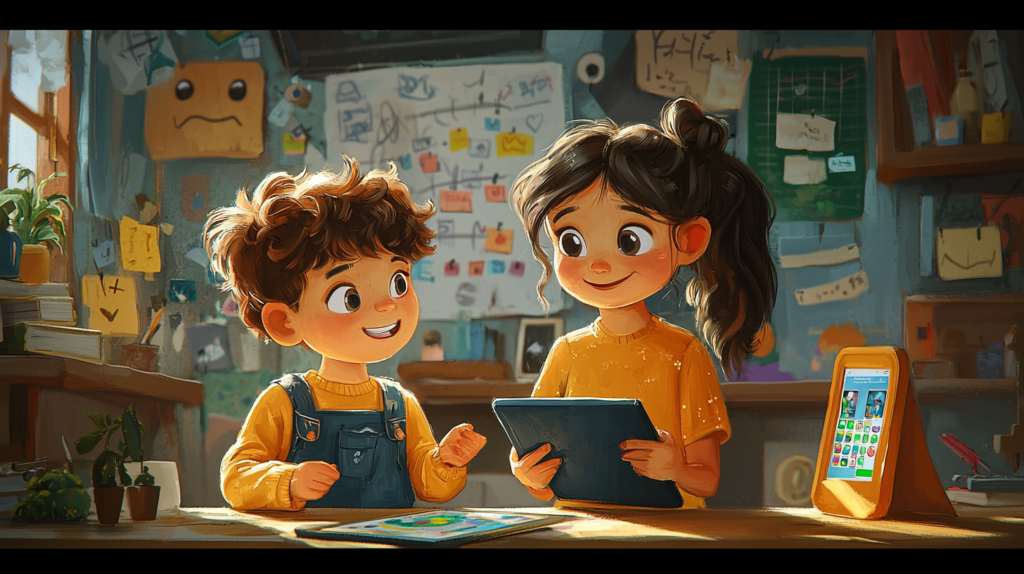by salvin.jeancharles@gmail.com
Share
by salvin.jeancharles@gmail.com
Share

Emotional Intelligence is an essential competency for kids, influencing their ability to comprehend and regulate their own emotions as well as their interactions with others.
Fostering this skill contributes to the development of healthier relationships and enhances emotional resilience when faced with challenges.
This article examines the effectiveness of interactive gaming as a means to cultivate emotional intelligence in kids, leveraging various gaming platforms and educational games.
It will provide practical strategies and recommendations for selecting appropriate games, understanding game mechanics, and integrating them into daily routines, thereby supporting your child’s emotional development and cognitive skills.
Engage with this content to explore how play and interactive storytelling can serve as pathways to emotional growth and behavioral skills development.
The Importance of Emotional Intelligence in Children
Emotional intelligence in kids is a crucial component that significantly impacts their overall development, influencing their capacity to navigate social interactions, manage their emotions, and establish meaningful relationships.
By cultivating emotional skills such as empathy and self-regulation, parents and educators can provide kids with a robust foundation for emotional awareness and behavioral competencies that facilitate their emotional growth and adaptability.
A comprehensive understanding of emotional intelligence not only supports cognitive development but also enhances social skills, which are vital for successful interactions across various contexts, including the digital environments and virtual collaboration commonly encountered in today’s world.
Research underscores the importance of nurturing emotional intelligence in children, linking it to reduced anxiety, improved social skills, and greater emotional resilience. As discussed in this article by Science of Mind, emotional intelligence plays a foundational role in children’s ability to manage their emotions and build positive relationships.

Understanding Emotional Intelligence and its Impact
Understanding emotional intelligence entails the recognition of various emotional cues and the development of self-awareness, both of which are essential for effective emotional expression and interaction with others, and contribute to stronger decision-making skills.
When individuals cultivate self-awareness, they become more attuned to their emotions and reactions, allowing them to navigate social situations with increased empathy and understanding. Behavioral insights are particularly significant, as they enable individuals to comprehend how emotions influence actions and decisions within different contexts, such as online safety and digital citizenship.
For kids, mastering these components can greatly enhance their social dynamics, as they learn to recognize and respond appropriately to the emotions of their peers. This recognition fosters healthier relationships, promoting collaboration and nurturing friendships that are founded on mutual respect and emotional support, thereby aiding in character building.
How Interactive Gaming Can Enhance Emotional Intelligence
Interactive gaming has emerged as an effective tool for enhancing emotional intelligence in kids, offering engaging and immersive experiences that promote emotional awareness and social skills through game-based learning.
Through game-based learning, kids are presented with various scenarios that challenge their emotional responses, thereby fostering resilience, empathy, and effective communication skills, as well as adaptability.

These digital play environments not only facilitate enjoyable learning experiences but also motivate kids to cultivate essential emotional skills in a safe and interactive setting.
Scientific research supports the effectiveness of interactive gaming in developing emotional intelligence. For instance, studies like ‘The Park of Emotions’ have demonstrated that structured digital experiences significantly improve children’s emotional skills, such as empathy and emotional regulation.
As described in Boosting Confidence Through Competition in Learning Games, competition in learning games can be a powerful tool for building confidence, a key element of emotional intelligence that empowers kids to face challenges with resilience.
Benefits of Using Interactive Games for Emotional Intelligence Development
The advantages of utilizing interactive games for the development of emotional intelligence are numerous, encompassing enhanced cognitive skills as well as improved teamwork and problem-solving capabilities, which are crucial for effective social-emotional learning.
By engaging in collaborative tasks, participants inherently acquire effective communication skills, fostering an environment where sharing ideas and negotiating solutions are essential.
This spirit of collaboration not only refines their social skills but also enhances their ability to manage emotions across various situations, promoting emotional literacy and strengthening teamwork skills.
As highlighted in Empowering Young Minds: How Logic Games Develop Problem-Solving Skills, logic games not only enhance problem-solving skills but also foster emotional resilience, helping kids approach challenges with a calm, analytical mindset.
Furthermore, these games frequently present challenges that necessitate critical thinking and strategic planning, leading to substantial cognitive growth among participants.
The combination of enjoyment and learning creates a dynamic platform for honing emotional resilience, rendering educational games exceptionally effective in cultivating both emotional maturity and intellectual development, alongside creativity and character development.
The broader benefits of educational games extend beyond emotional intelligence. An article from GameCloud shows that these games can improve cognitive functions, memory, and social-emotional learning skills, fostering qualities like self-awareness, empathy, and effective communication through interactive play.
Digital tools are transforming the ways we approach social and emotional learning for children. According to Edutopia, these tools offer innovative pathways for fostering essential skills like empathy, self-regulation, and collaborative decision-making in young learners as they explain it in their article.

Choosing the Right Interactive Games for Kids
Selecting appropriate interactive games for kids is crucial for targeting specific emotional skills and ensuring effective learning outcomes, especially in the realms of emotional literacy and self-awareness, and supporting their overall child development.
Finding Games that Target Specific Emotional Skills
Identifying games that effectively target specific emotional skills, such as empathy training and conflict resolution, is essential for maximizing the development of emotional intelligence in kids. This is particularly true in multiplayer games and virtual environments.
Engaging in scenario-based learning enables kids to immerse themselves in situations that require the navigation of emotions and social dynamics. For instance, role-playing games like “The Empathy Game” encourage players to adopt the perspectives of others, thereby facilitating a deeper understanding of diverse viewpoints.
Similarly, games focused on conflict resolution, such as “The Conflict Resolution Challenge”, present dilemmas that players must collaboratively solve, thereby fostering teamwork and negotiation skills, enhancing their social scenarios and fostering emotional tracking.
These activities not only promote emotional awareness but also allow kids to model positive behaviors, ultimately enhancing their interpersonal relationships and emotional resilience, ensuring age-appropriate content and fostering developmental milestones.
Incorporating Interactive Gaming into Daily Routines
Incorporating interactive gaming into daily routines can offer kids enriching experiences that enhance emotional intelligence, while also ensuring a balance in screen time and promoting engagement in safe environments, leveraging educational technology and gamification techniques.
Integrating Games into Learning and Playtime
Integrating games into educational settings and recreational activities can foster enjoyable learning opportunities that promote collaboration and peer interaction while addressing emotional challenges, through play-based learning and interactive exercises.
When students participate in collaborative play, they not only enhance their problem-solving abilities but also develop a sense of community and shared responsibility.
This integration enables educators to create immersive experiences wherein traditional lessons are transformed into interactive quests, allowing learners to confront and navigate emotional obstacles within a supportive environment, using gamification and interactive storytelling.
As they collaborate to overcome challenges, learners can cultivate resilience and empathy—essential skills that significantly enhance their educational journey. By intertwining gaming with conventional teaching methods, the potential for enriching learning experiences is boundless, paving the way for a more dynamic and engaging classroom atmosphere, promoting creativity and intrinsic motivation.
Measuring Progress and Success
Measuring progress and success in the development of emotional intelligence can be accomplished through various methodologies, including feedback loops and reflective practices that prioritize emotional safety for kids. These practices may involve game-based assessment and emotional tracking for more accurate insights.
Assessing Emotional Intelligence Growth through Gaming
Assessing the growth of emotional intelligence through gaming entails a thorough examination of interactive feedback and the identification of emotional triggers that contribute to kids’ development, leveraging game-based assessment tools.
By engaging with various gaming scenarios, players receive real-time feedback that accurately reflects their emotional responses and decision-making processes. This interaction not only underscores the immediate consequences of their choices but also promotes self-awareness, mindfulness, and encourages reflection on personal emotional growth.
Observing kids’ reactions to challenges and their collaboration with peers can yield valuable insights into their levels of empathy and social awareness.
Success metrics, such as improvements in teamwork or enhanced problem-solving abilities, can be derived from these experiences, serving as effective benchmarks for evaluating the development of emotional intelligence over time, and demonstrating the benefits of digital games in emotional and cognitive engagement.
Tips for Parents and Caregivers
Parents and caregivers play a crucial role in supporting and promoting the development of emotional intelligence in kids. They utilize a range of techniques, including positive reinforcement and interactive feedback, to create a nurturing environment conducive to this growth.

Supporting and Encouraging Emotional Intelligence Development
Supporting and promoting the development of emotional intelligence necessitates the establishment of an emotionally safe environment in which kids can cultivate behavioral skills and foster positive relationships and emotional expression.
This foundational atmosphere enables kids to express their feelings openly, with the assurance that they are both heard and understood.
Parents play a crucial role in this developmental journey; by actively listening and validating their children’s emotions, they can contribute significantly to the cultivation of resilience and empathy, which are essential for mental health and emotional growth.
Employing strategies such as engaging in open discussions about emotions, modeling healthy emotional responses, and encouraging problem-solving can enable kids to effectively navigate their emotional landscape, fostering emotional recognition and emotional expression.
Additionally, regular family activities designed to promote connection and communication can further strengthen this vital support system, ensuring that kids not only acquire robust relational skills but also feel valued and secure in their emotional experiences, thereby enhancing their self-esteem and character building.
FAQ
What is emotional intelligence and why is it important for kids?
Emotional intelligence is the ability to understand and manage one’s own emotions, as well as the emotions of others. It is important for kids because it helps them develop strong communication skills, empathy, self-awareness, and problem-solving abilities. It also builds emotional resilience, which is crucial for child development.
How can interactive gaming help enhance emotional intelligence in kids?
Interactive gaming provides a safe and fun environment for kids to practice emotional regulation, decision-making, and social skills. Using various gaming platforms, it also allows for feedback and learning opportunities in a low-stress setting. This can improve cognitive skills and emotional literacy.
Are there any specific games that are recommended for enhancing emotional intelligence in kids?
Yes, games that involve cooperation, problem-solving, and emotional expression are great for enhancing emotional intelligence in kids. Educational games and simulation games like Minecraft, Animal Crossing, and Just Dance can promote communication skills, teamwork, and emotional recognition.
Can interactive gaming help with anger management and impulse control in kids?
Yes, through interactive gaming, kids can learn to identify and manage their emotions in a controlled environment. Role-playing games and narrative games can help with anger management and impulse control, significantly improving behavioral skills in real-life situations.
How can parents incorporate interactive gaming into their child’s daily routine?
Parents can set aside specific times for interactive gaming as a part of their child’s daily routine. They can also join in on the gaming, using it as a way to connect with their child and teach them valuable skills such as conflict resolution, emotional support, and positive reinforcement. Parental involvement ensures age-appropriate gaming and safe gaming practices.
Is there a balance to be maintained between traditional play and interactive gaming for enhancing emotional intelligence in kids?
Yes, while interactive gaming can be a helpful tool, it should not replace traditional play and other activities that promote emotional intelligence, such as reading, imaginative play, and outdoor activities. Play-based learning and creative activities help in cognitive development and emotional growth. It is important to find a balance between different forms of play for optimal development, including fun learning and screen time management.
Conclusion
Interactive Gaming offers a promising avenue for enhancing emotional intelligence in children. By integrating engaging and immersive game-based experiences into daily routines, parents and educators can promote emotional awareness, empathy, and social skills in a supportive environment. These games not only foster cognitive development but also help children navigate social challenges, build resilience, and strengthen interpersonal relationships.
If you’re looking to support your child’s emotional and cognitive growth through interactive gaming, explore our curated list of educational games and practical strategies. Start today to create a balanced learning experience that harnesses the power of play for emotional development. Ready to unlock your child’s potential? Discover more insights and resources by subscribing to our newsletter or reaching out to our team for personalized recommendations.
For an engaging start, explore Monkey Learning, a math app designed to teach through fun games and personalized feedback. Begin your child’s learning journey today by visiting the Monkey Learning app on the App Store.
STAY IN THE LOOP
Subscribe to our free newsletter.
Are you in search of an engaging and interactive method to acquaint your children with the realm of music? Your quest ends here. The following discourse will delve into the paramount music educational games that are adept at not only providing amusement to your young ones but also fostering an affinity for music within them. […]
Are you in search of entertaining and educational games suitable for preschool-aged children? This article presents a curated selection of the top 10 learning games tailored for preschoolers, designed to both engage and instruct young minds. Spanning activities like shape sorting and phonics exercises, these games encompass a diverse array of skills presented in a […]
If one is seeking a dynamic and engaging method to cultivate a child’s creativity, there are various art educational games available that can be highly beneficial. For a comprehensive list of the top educational games for children, including those tailored to different age groups and learning styles, check out our article on Top 10 Best […]
Are you seeking an engaging and interactive method to enhance your child’s mathematical abilities? Monkey Learning stands out as one of the premier interactive educational games available for fostering engaged learning on both iPad and Android platforms. Its vibrant interface, hands-on exercises, and progress monitoring functionalities are carefully crafted to inject enthusiasm into the process […]




